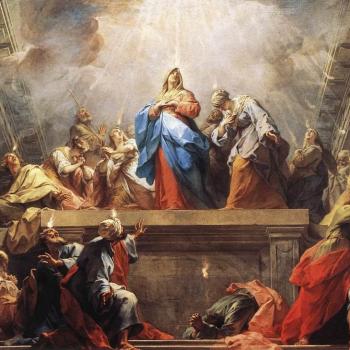On August 2, 1527 the bubonic plague returned to the German city of Wittenberg. It had been nearly two centuries since the Black Death, but that dreaded disease had continued to flare up, killing 30% or more of the population in each of its periodic outbreaks. Though the students and faculty of Wittenberg were told to leave the city, that university’s most famous professor stayed put: teaching, preaching, advising the city council, and ministering to the sick.
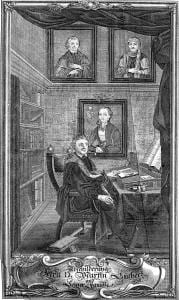
My guess is that most of you already know the professor’s name: Martin Luther. As Christians have grappled with the implications of our own public health crisis, many have turned to the letter Luther wrote in 1527, “Whether One May Flee From a Deadly Plague.” Back in late January, when COVID-19 was largely associated with the Chinese city of Wuhan, a medical student named Emmy Yang recommended Luther’s letter to the readers of Christianity Today. For several days now, the most popular post at Patheos has been Grayson Gilbert’s reflection on the same letter. Just yesterday I saw three different Facebook friends share Luther’s words.
For the reformer, Gilbert explained, “there was an obligation to help those who contracted the plague, but so long as they were helped, it was a matter of conscience if one remained to aide [sic] in this great task… What is unique to Martin Luther is that all of these words were backed by his willingness to actually follow his own advice. Not only did he and Katharina open their own home as a ward to the infected, but he recognized the opportunity to preach Christ to those literally days away from death.”
I’d recommend reading Luther’s letter itself, plus the commentaries from writers like Yang and Gilbert. But I’d like to offer some historical and theological context, to help us understand why Luther was writing, how readers might have heard him, and what his advice might be today.
The Plague and the Reformation
First, we should understand that plague was never far from most Europeans’ experience. By one calculation, there was a significant outbreak on average of every nine years from the 1490s through the mid-17th century. Luther himself was no stranger to the disease; it had struck the university town of Erfurt in 1505, in the middle of his famous transition from rising law student to troubled Augustinian monk.
And the plague intersected with the history of the Reformation in several other spots. Eight years before it came to Wittenberg, plague killed 1,500 people in the Swiss canton of Zurich, including Andreas Zwingli. His brother Huldrych, newly called as preacher of the city’s largest church, nearly succumbed himself. Michael Massing concludes that Zwingli’s brush with the plague served as “the precipitating event” for that priest becoming the early leader of the Swiss Reformation, as the nearness of death persuaded the humanist-educated Zwingli that “Erasmian-style exhortations to virtue seemed unavailing; seeking spiritual transformation, Zwingli found redemption in the reborn Christ.” (Erasmus himself, always in precarious health, fled the plague several times before and during the Reformation.)
That same year, 1519, plague also broke out in Paris, one of the intellectual centers of Europe. Among the university students who fled was Conrad Grebel, who ended up returning to Zurich and coming under the influence of Zwingli. Over time, however, Grebel and other Zwinglians broke with their mentor, as their study of Scripture convinced them that infants were not meant to be baptized. With the support of Zwingli, the city council persecuted such early Anabaptists. Grebel managed to escape jail in 1526 and flee to Maienfeld, where another outbreak of the plague dealt a final blow to his weakened health.
A year later the same disease took the life of another Anabaptist leader, Hans Denck, who had taken refuge in Basel. In 1541, that same Swiss city became the final resting place of the radical theologian Andreas Karlstadt. His estranged friend Martin Luther found the cause of death ironic, since Karlstadt was “the plague himself of the Basle Church.”
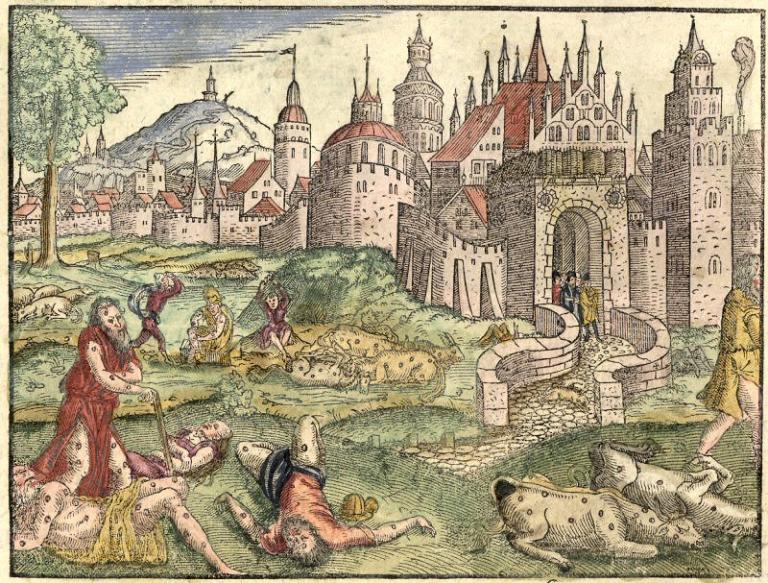
It wasn’t just Protestants who were affected. In 1522 a Dutch scholar sympathetic to Erasmus was inaugurated as Pope Adrian VI, in the middle of an outbreak of plague that was killing nearly three dozen Romans a day. While all but one of his cardinals fled, Adrian stayed, hoping to bring about a moral and intellectual reformation of the Church. He died a year later (not from plague) at age 64 and was succeeded by Clement VII, who was in Rome when plague returned in 1527 — while German soldiers sacked the city and the papal court sheltered in the Castel Sant’Angelo.
That was just a few months before the plague hit Wittenberg. Luther’s response to the crisis was motivated by more than just pastoral concern. When Lutherans fled the disease, a Dominican polemicist used such stories as ammunition in the war of words raging between Catholics and Protestants.
Plague as “God’s Punishment”
As he started his letter, Luther acknowledged that how one responded to the plague could be viewed as a test of faith in God. He could not “censure” those who stayed in a plague-stricken city, believing that “death is God’s punishment, which he sends upon us for our sins… They look upon running away as an outright wrong and as lack of belief in God.”
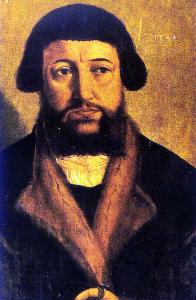
Such a view was hardly unusual in the 16th century. Ten years after Luther’s letter from Wittenberg, plague threatened the city of Nuremberg. That city’s leading Lutheran pastor responded by preaching on the same psalm Philip discussed yesterday. Andreas Osiander gravely affirmed that “this horrible plague of pestilence cometh out of God’s wrath, because of the despising and transgressing of his godly commandments.”
Luther did not doubt the reality of God’s judgments, but refused to condemn those who tried to escape death. Otherwise, he argued, no one should try to escape a burning house or save themselves from drowning. “Why do you eat and drink,” he continued, “instead of letting yourself be punished until hunger and thirst stop of themselves?” Would such Christians no longer join Jesus in praying that God would “deliver us from evil”?
Even someone so highly educated as Martin Luther did not understand the causes of a disease like the bubonic plague. But while Osiander warned against attributing epidemics to “natural” causes rather than God’s mysterious judgments, Luther rebuked Christians who make “no use of intelligence or medicine,” those who
do not avoid places and persons infected by the plague, but lightheartedly make sport of it… They say that it is God’s punishment; if he wants to protect them he can do so without medicines or our carefulness. This is not trusting God, but tempting him. God has created medicines and provided us with intelligence to guard and take good care of the body so that we can live in good health.
And that’s a good word in our own time. Our “intelligence or medicine” is far beyond that of Luther’s day, yet some Christians continue to ignore the advice of doctors, scientists, and public health officials.
The Particularity of Vocation
But as importantly, we should recognize in Luther’s response to the plague his doctrine of Christian vocation.
According to the Lutheran scholar Kathryn Kleinhans, “Luther broadened the concept of vocation from a narrow ecclesiastical focus to describe the life and work of all Christians in response to God’s call.” As Luther helped Protestants extend their understanding of vocation from a special focus on monastic or clerical calling, they learned to “reject the call to be ‘apart from’ the world in favor of a call to be ‘a part of’ the world. It was not the nature of a work itself that was determinative for the Lutheran understanding of vocation, either as affirmation of a special spiritual work or as rejection of a particularly secular work. What was determinative was responding in faith to God’s call to be of service.”
Being called “to be of service” runs through all of Luther’s 1527 letter on the plague. While it was “natural… and not forbidden” to save one’s own life, there was a higher calling to love God and one’s neighbor. It was only “as long as he does not neglect his duty toward his neighbor” that one could choose to flee the plague. Likewise, Osiander’s 1537 sermon on plague criticized those who “out of inordinate fear of this plague, leave their calling and office, maliciously withdrawing the love, help, and faithfulness which they (out of God’s commandment) are bound to show unto their neighbors….”
And particular callings might require particular courage. Not surprisingly, Luther expected healthcare workers to continue to care for the body, and preachers and pastors to keep caring for souls. (Though he also allowed, in each case, that they could leave if enough others remained to care for the sick and dying.) But don’t skip past this paragraph from early in Luther’s letter:
…all those in public office such as mayors, judges, and the like are under obligation to remain. This, too, is God’s word, which institutes secular authority and commands that town and country be ruled, protected, and preserved, as St. Paul teaches in Romans 13 [:4], “The governing authorities are God’s ministers for your own good.”
Though his chief concern here was with maintaining social order, Luther also dreamed of a government so efficient that it would “maintain municipal homes and hospitals staffed with people to take care of the sick… That would indeed be a fine, commendable, and Christian arrangement to which everyone should offer generous help and contributions, particularly the government.”
(The particular calling of political leaders in the midst of a public health crisis was also central to Theodore Beza’s Treatise on the Plague. Writing in 1580, Geneva’s leading theologian held it the “duty of the Christian Magistrate to provide that those things which either breed or nourish the plague, so far as may be, be taken away, and that regard may be had of those that be visited with this sickness, that all be not driven to be careful for all. But how they that serve in any public Civil office may leave their charge in the time of plague, I do not see…”)
So I hope that everyone who is sharing Luther’s letter as a spiritual reassurance also takes it as a prompt to consider how well our current political leaders are fulfilling their calling to service. Faced with a public health crisis, for example, we should hope that the president of the United States would behave as prudently, decisively, and honestly as governors like Mike DeWine (R-Ohio) and Gretchen Whitmer (D-Michigan) have. Alas Donald Trump, without literally fleeing an epidemic, has repeatedly abandoned the reality of the situation. While his sober news conference yesterday was a step in the right direction, it doesn’t erase the fact that he has repeatedly ignored and even contradicted the advice of his own experts, that he took steps before and during the COVID outbreak that undercut the ability of public authorities to preserve the health of citizens.
In one of his table talks, Luther hoped to see government placed in the hands of
understanding, wise, and courageous men, who are to be trusted, and who aim at the common good and prosperity, not seeking their own gain and profit, or following their own desires, pleasures, and delights, but how few governors and rulers think thereon? They make a trade and traffic of government; they cannot govern themselves: how, then, should they govern great territories and multitudes of people….
How, indeed?
The Plurality of Vocation
But even as I want to remind each of you of your calling as citizens of a democratic republic, in which leaders are accountable to the people, it’s also important to underscore that we all have multiple callings. “The arenas of worldly activity identified by Luther,” Kleinhans continued, “are not mutually exclusive: one can be a parent, an employer or an employee, a citizen, and a member of the Christian community simultaneously.”
For Martin Luther, Christian vocation was both particular and plural.
For example, I’ve felt clearly the pull of multiple callings in recent days. As a teacher, I’ve been preparing to move my classes online, at least through Easter and likely far beyond it. But I’ve also wondered if historians, given platforms like this, could draw on the past to help teach the wider public about the demands of the present. That’s certainly part of the motivation for this post, as for the one I wrote last week on Christian responses to the influenza pandemic of 1918.
But historian and teacher are but two of my callings. I’m also a father and a husband, a son and a brother. I’m in a position to serve many, but none need me as much as my family.
I started thinking about this last week. Back when colleges were still holding face-to-face classes, I had asked a friend who is an ordained Lutheran pastor to talk to some of my students. She told the story of her midlife call to ministry, but explained that her most important vocation, in this moment, was that of daughter to her mother, dying of Parkinson’s disease. She had taken a sabbatical from her job as pastor in order to have time to travel to and from her hometown.
As she talked about her multiple vocations, I recognized the most problematic aspect of Luther’s response to the 1527 plague. Was he being faithful to his calling when he continued to teach, preach, and minister, or when he wrote the letter Christians read to this day? Certainly, as a professor and pastor. But what about his calling as a father and husband?
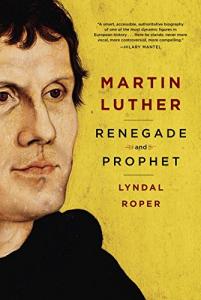 In the end, Luther’s faithfulness to his pastoral calling proved costly for his family. His decision to stay meant that his wife and children were exposed to the plague. While one-year old Hans recovered from illness and Katy Luther survived to deliver their first daughter, young Elisabeth Luther died less than eight months into her life. That tension between multiple vocations runs through the ambivalent judgment of one of Luther’s best recent biographers, Lyndal Roper:
In the end, Luther’s faithfulness to his pastoral calling proved costly for his family. His decision to stay meant that his wife and children were exposed to the plague. While one-year old Hans recovered from illness and Katy Luther survived to deliver their first daughter, young Elisabeth Luther died less than eight months into her life. That tension between multiple vocations runs through the ambivalent judgment of one of Luther’s best recent biographers, Lyndal Roper:
Luther’s decision to remain in Wittenberg was bold, but also revealed a reckless disregard for his own safety and that of his family. It may have been a residue of his wish for martyrdom, or, perhaps, another example of the remarkable courage that enabled him not to shirk what he felt to be his responsibility to his flock.







